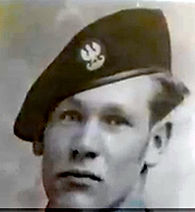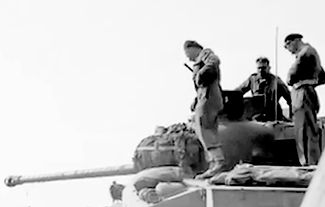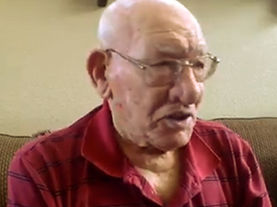
Jan BRODA
1st Polish Armoured Division (1PAD)
___________________________________________________
Like thousands of high school graduates in 1943, Jan Broda was a farm kid who went straight into the army to fight in World War II.
In June of 1944, he was part of the Allied forces that stormed the beaches at Normandy, France and turned the tide of the war against Hitler. His unit landed at Juno Beach.
But Broda's path from high school to the D-Day invasion was hardly conventional – especially considering that the first eight months of his military career was spent in a German uniform.
Broda was born in a small village in the Silesia Province of Poland. He was among the estimated 225,000 Polish citizens forcibly conscripted into the German armed forces. Germany had invaded Poland in1939 and controlled the country.
"I had to go into the army," Broda recalled. "If I didn't, my family would have been persecuted."
During the German occupation, Poland had a strong resistance movement and virtually all of those forced into service, Broda included, looked for a chance to escape, a task easier said than done.
"There were always a number of Germans around, watching us all the time," he said.
It was seven months before the opportunity presented itself for Broda. He had been sent to France as part of the German occupying force of that country. He met people from the French Underground, who knew he was Polish, and a bond was created.
One night, he was able to slip away, was given French civilian clothing and his German uniform was destroyed. It was a stressful situation with his fate in the hands of the French resistance.
"I was with a bunch of Frenchmen living in a cave for a while," he said. " They treated me like their own. They risked their lives for me."
He was whisked from one hiding spot to another until finally, he was taken to the shoreline where a Canadian submarine waited.
"The next morning, I was in England," he said.
Once in England, Broda quickly discovered that he was not alone. Thousands of his countrymen who had similarly escaped from the Germans, or the Russians, were there. The 1st Polish Armoured Division was attached to the British and Canadian forces.
Broda was assigned to the 11th battalion of the 21st Army Group. The 21st consisted of British, Canadian, Polish, Czechoslovak, Dutch and Belgian forces.
The landing at Juno Beach on D-Day was one of his most vivid memories because bagpipes were being played as the forces came ashore.
Like at the other beaches (Omaha, Utah, Sword and Gold) used in the invasion, German resistance was strong and the fighting was fierce, with the first wave taking heavy casualties. But by the end of a long day of fighting, the Allied forces had moved through the German line.
Moving inland was also challenging every step of the way. "There were hedge rows and walls and Germans behind them," he said.
Broda spent much of the war as a tank in the 1st Polish Armored Division and engaged in many battles as the division pursued the Germans through France to Belgium and the Netherlands and finally into Germany in April 1945. In Holland, he was hit with a piece of shrapnel in the lower leg, his only significant injury of the war.
The road to America
After the defeat of Germany, Broda returned to England. While he and many of his countrymen thought about returning to Poland, it was under the control of the Soviet Union.
Instead, Broda remained in England, getting a job in the construction industry where he operated bulldozers, cranes and other heavy equipment.
In 1948, the U.S. Congress passed a bill that granted U.S. citizenship to Polish veterans of World War II.
Broda arrived in New York on March 6, 1952 and eventually settled in the Chicago area. He officially became a U.S. citizen in 1959. He landed a job with Chicago Transit and stayed there for the next 33 years before semi-retiring.
In 1980, he met actor Steve McQueen, who was filming the movie, "The Hunter," of which several scenes involved the El Train in Chicago. Broda was an extra in the movie.
After he retired from Chicago Transit, he worked part-time as a bank guard for Cole-Taylor Bank and was hailed on WGN, a Chicago television station, after knocking out a bank robber.
For many years, Broda and other Polish veterans of the war who had settled in the Chicago area, gathered regularly for the fellowship and to reminisce. In recent years, those numbers dwindled.
"Most of those guys are gone now," he said. " There are a few of us scattered all over."
After the death of his wife three years ago, Broda moved to Nevada to live with his daughter and son-in-law in Dayton.
Travel was his favorite hobby; he's been to 47 states and every Canadian province.
Of his time in World War II, he says that it sometimes seems as if it was only yesterday. "Sometimes, I still feel the chills," he said. "In some cases, it makes me cry still today."
Source:
https://www.rgj.com/story/life/2014/06/02/polish-soldier-vivid-memories-world-war-ii/9869331/



Jan in 1945 in the 1st Polish Armoured Division / Tank crew during WW2 / Jan at age 88